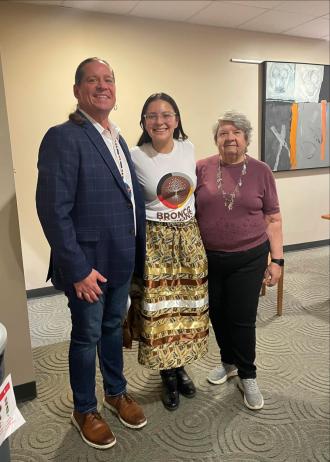WMU launches Native American elders-in-residence program
KALAMAZOO, Mich.—A new program will bridge the generational gap between students and Indigenous leaders at Western Michigan University. The University received a nearly $15,000 award from the Native American Heritage Fund (NAHF) to launch an elders-in-residence program called “Sharing Wisdom Across Generations.”
Western’s Native American Affairs Council will consult with elders and councils of the three Potawatomi tribal nations in Southwest Michigan: Gun Lake, Pokagon and Nottawaseppi Huron Band of Potawatomi.
"These elders may have attended a boarding school in the region or maybe they lived on the reservation their whole life. Or maybe they have experience as a veteran or an entrepreneur. They certainly have knowledge and wisdom to share with students," Dr. Dee Sherwood, director of the Native American Affairs Council. "We have a very age-specific learning model in our education system, and we don't have a lot of opportunities to learn from our older generations. So, I think this is a really awesome opportunity, and we appreciate the Native American Heritage Fund for providing that to us."
Through the program, three elders will hold regular office hours on Main Campus in Moore Hall and participate in 10 events over the next year that could range from drum workshops and making ribbon pants and skirts to doing bead work and talking circles discussing Native American culture.
"Students are very interested in learning about traditional ecological knowledge and cultural teachings and Indigenous lifeways," says Sherwood.
"This can be a hub for education for both Native and non-Native students," adds Shabanaa Bush, an aerospace engineering student and president of Western’s Native American Student Organization (NASO). "I see this as a really great way for us to be able to start that intergenerational healing and that cultural education and outreach that we wanted to bring from NASO."
Beyond cultural and educational benefits, Sherwood says having elders-in-residence could also build capacity for internship opportunities for students or future jobs with tribal nations.
Western will be recognized alongside 10 other educational and community organizations selected for grants during an award ceremony on Friday, Sept. 19, at FireKeepers Casino Hotel, following the NAHF board meeting at 11 a.m. The event is open to the public.
"Since its inception, the Native American Heritage Fund has been a catalyst for positive change in Michigan communities. Our mission goes beyond financial support," says Dorie Rios, NAHF chairperson, who also serves as a Tribal Council Chairperson for the Nottawaseppi Huron Band of the Potawatomi. "We partner with communities through every step of the process—from education and cultural guidance to implementation—so that changes are not only made, but made meaningfully. These grants help restore accurate representation, uplift Indigenous voices, and build stronger bridges between Tribes and local communities."
Programming for Western's elders-in-residence program is currently being developed. More details will be announced by the Native American Affairs Council once events are determined.
For more WMU news, arts and events, visit WMU News online.


